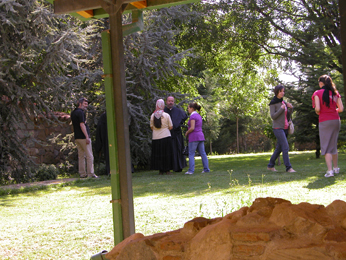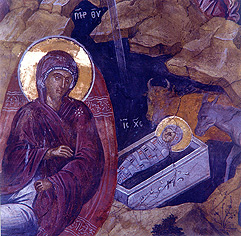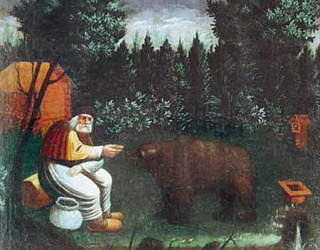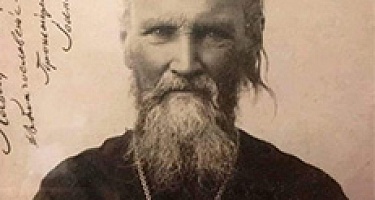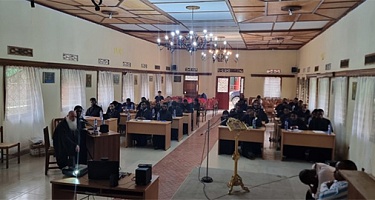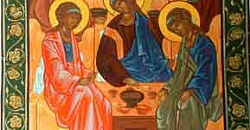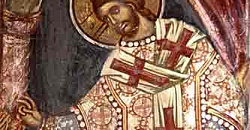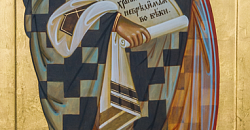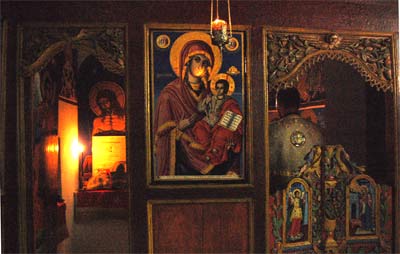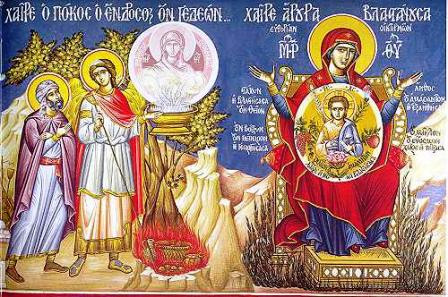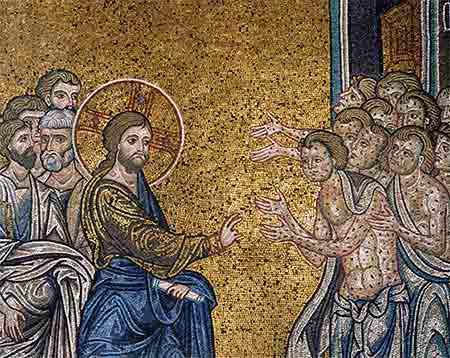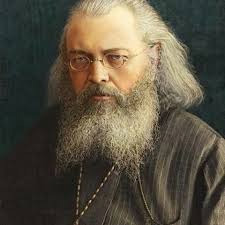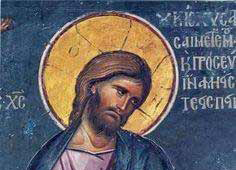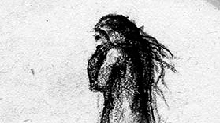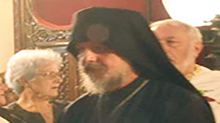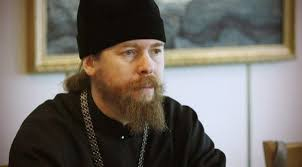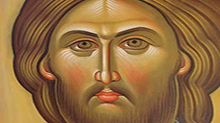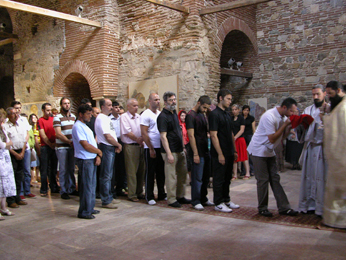
Во она време врвејќи Исус покрај Галилејското море, ги виде двајцата браќа, Симон, наречен Петар, и брат му Андреј, како фрлаат мрежа во морето, бидејќи беа рибари, и им рече: „Врвете по Мене и Јас ќе ве направам ловци на луѓе“.
И тие одеднаш ги оставија мрежите и тргнаа по Него.
А оттаму замина понатака и виде други двајца браќа, Јаков Заведеев и брат му Јован, во кораб со Заведеј, татко им, кои си ги крпеа мрежите свои, и ги повика.
И тие наеднаш го оставија коработ и татко си и тргнаа по Него.
И одеше Исус по цела Галилеја и кога поучуваше по синагогите, го проповедаше Евангелието на Царството и лекуваше секаква болест и слабост кај народот (Матеј 4, 18–23).
Зошто, деца, Богочовекот вели ‘ловци на луѓе’, а не на пример учители или водачи или нешто слично? Ве прашувам затоа што ловците вообичаено ловат бесловесни животни, а за вистински лов на луѓе овде не може да стане збор. Господ Исус Христос сепак токму терминот ловци го користи. Ајде да видиме зошто.
Да не одиме толку далеку, од падот на прародителот Адам и фактот дека сме наследници на последиците од неговиот пад, тоа горе-доле теоретски на сите ни е познато. Да тргнеме веднаш од она што ни е многу добро познато и што секојдневно го живееме.
Да се запрашаме самите себеси: дали сме носители на дарот на умносрдечната молитва, односно дали нашиот ум може молитвено да престојува во нашето срце онолку колку што сакаме. Очигледно, не. Што е причината? Заробеноста на нашето срце од бесловесните страсти. И знаеме убаво дека пред сè тоа е бесловесната страст на славољубието, на високото мислење за самите себе; или во најмала рака фактот дека нашиот ум и разум го поставуваме за критериум на сè – она што, од наше ниво на духовен развој и со светлината на умот што ја имаме, ќе го заклучиме дека е така, тоа е за нас така и никако поинаку. Арно ама, ако не е така, не се запрашуваме за последиците од погрешниот заклучок по нашиот духовен развој. Во најдобар случај еден ден ќе ги освестиме тие последици како затвореност на срцето за молитва на умот внатре во него.
Лекот го знаеме, а не го користиме. Тоа е апсолутно, слепо и целосрдечно послушание. Тоа е ставањето на нашиот ум преку послушанието во процесот на исцеление. Откако оставивме сè и тргнавме по Христос, тука се сопнавме. Ова свети Јован Лествичник го нарекува ‘бродолом во пристаниште’. Ајде, браќата монаси и можам некако да ги сфатам затоа што особено пограмотните од нив се сопнуваат на бесловесната страст по чинови и високи позиции во Црквата или, што важи за сите останати, на бесловесната страст барем да бидат духовни водачи или нешто да значат меѓу луѓето. Што не значи и дека ги оправдувам. Но на вас, сестрите, што ви е проблемот? Самата ваша позиција во Црквата е таква што ви овозможува непречено да ја живеете тајната на умирањето за светот и животот за Бог во Нашиот Господ Исус Христос. Ниту можете, според каноните, да бидете ракоположени во свештенички чинови, ниту можете да добиете некоја важна позиција во Црквата, ниту ви треба нешто да им значите на луѓето, освен молитвено. Да не дозволиме молитвата на срцето да биде реткост помеѓу нас.
Ако за нас кои живееме во манастир работите стојат вака, како ли стојат за оние кои живеат во светот? Ако пак ли за учениците Христови ова важи, тогаш што да речеме за оние што уште не поверувале? Односно, ако ние кои сме свесни дека сме заробени од бесловесната страст и се бориме против неа, уште не можеме да се ослободиме, тогаш што ли се случува со оние кои ниту се свесни дека се заробени од бесловесните страсти ниту се свесни дека се водени од нив во пропаст? Ова, особено кога знаеме дека водач, пак, на секоја бесловесна страст е злословесниот демон.
Сега, што да речеме за оние луѓе кои себеси се сметаат за словесни, а во суштина свесно или несвесно се заведени од бесловесните страсти, водени од злословесниот демон. Можеме ли таквите луѓе навистина да ги сметаме за словесни, за мудри, за паметни, за разумни, за интелектуалци, за учители, за водачи на слепи? Нормално, не. Па биле тие и паметни, и разумни, и интелектуалци, и учители и водачи на слепи, според критериумите на светот. Што ли да речеме пак за оние што ни според световни критериуми не се тоа, иако со нив е полесно? Никогаш да не ги изумиме учењето и вистината што произлегуваат од светоотечкиот опит дека едно е знаењето и просветленоста што произлегуваат од читањето книги, а друго од живиот опит на Бог во срцето, она што е дар на Светиот Дух Господ.
Дали сега ви е јасно, деца, зошто Богочовекот Христос им вели на светите апостоли Петар и Андреј дека ќе ги направи ‘ловци на луѓе’? Верувам дека ви е јасно. И можете да си замислите, ако денес е вака после две илјади години христијанство, како ли било тогаш и каква ли бесловесност владеела меѓу луѓето. Затоа и Христос правел толку чуда во она време, наспроти секојдневноста и јавноста на демонските чуда направени од слугите на демонот. Затоа и апостолите правеле толку чуда. Затоа и светите маченици правеле толку чуда. Затоа и на крај ќе се врати времето на чудата, исто како и секој пат кога се враќало времето на прогонот.
Но, никој не се раѓа како ‘ловец на луѓе’. ‘Ловец на луѓе’ се станува. А се станува преку личен подвиг во Црквата и преку благодатта на Светиот Дух. Затоа и Христос вели: „Врвете по Мене и Јас ќе ве направам ‘ловци на луѓе’!“ Би сакал само уште малку да се задржиме на прашањето кои се карактеристиките на ‘ловецот на луѓе’, затоа што патот до тоа како се станува, го знаете: со восогласување на нашиот живот и подвиг согласно нивото од духовниот развој на кое се наоѓаме.
Како што бесловесното животно бега од ловецот, така и луѓето заведени од бесловесните страсти демонот ги води далеку од Црквата и од духовните отци. И како што обичниот ловец треба да биде искусен за да го фати својот плен, така и ‘ловецот на луѓе’, односно духовниот отец треба да биде опитен за да ги приведе луѓето кон спасение. Духовниот отец треба најпрво своето срце да го очисти од страстите, да го добие дарот на умносрдечната молитва и најмалку да достигне барем просветление на умот за да може оние што ќе ги привлече кон Богочовекот Христос и Неговата Црква да ги води по патот на очистување на срцето и просветлувањето на умот. Оние кај кои ќе успее верата да им ја претвори во опит и во знаење, никогаш повеќе нема да ги изгуби.
‘Ловец на луѓе’ може да се нарече само човек со омолитвено просветлен ум, човек со слово што извира од неговото очистено срце и кое допира до длабочината на срцето на ближниот и човек со присуство во сила. Во негово присуство страстите се парализираат, демонот бега далеку, а неговото слово внесува светлина, сила и надеж во срцето на другиот човек. Но и кога таквиот ќе се оддалечи од својот ближен и кога страста повторно ќе живне и кога демонот повторно ќе се врати, тој не го остава сам. Тој со молитвата во своето срце ги одржува светлината, силата и надежта, односно семето што го посеал во срцето на својот ближен. Семето кое во содејство со слободната волја на оној во кој е посеано и со помош на благодатта на Светиот Дух може да из’рти, да порасне и да донесе плод – ослободување на срцето од страстите.
И да не заборавам, за крај, не треба да врвиме по Христос затоа што ни ветува дека ќе нè направи ‘ловци на луѓе’. Иако е многу потребно, тоа не би требало да биде причина за врвење по Христос, затоа што тоа е смешно. Туку затоа што Он прв и Единствен нè возљуби. Заслужува да оставиме сè, пред сè својата гордост и да тргнеме по Него без никакво ветување и без оглед на колку тоа ќе нè чини: А оттаму замина понатака и виде други двајца браќа, Јаков Заведеев и брат му Јован, во кораб со Заведеj, татко им, кои си ги крпеа мрежите свои, и ги повика. И тие наеднаш го оставија коработ и таткo си и тргнаа по Него.
Митрополит Струмички Наум
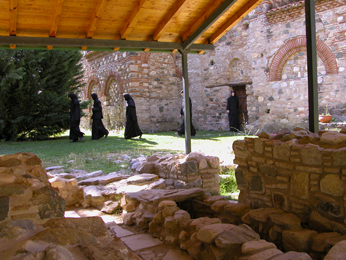
Fishers of Men
And Jesus, walking by the Sea of Galilee, saw two brothers, Simon called Peter, and Andrew his brother, casting a net into the sea; for they were fishermen. Then He said to them, “Follow Me, and I will make you fishers of men.”
They immediately left their nets and followed Him.
Going on from there, He saw two other brothers, James the son of Zebedee, and John his brother, in the boat with Zebedee their father, mending their nets. He called them.
And immediately they left the boat and their father, and followed Him.
And Jesus went about all Galilee, teaching in their synagogues, preaching the Gospel of the Kingdom, and healing all kinds of sickness and all kinds of disease among the people (Matthew 4:18-23).
Why does, my children, the Godman say “fishers (hunters) of men”, rather than, for example, teachers or leaders or something similar? I am asking you because hunters usually catch irrational animals, and about a real hunt of people here there can be no word. Still the Lord Jesus Christ uses precisely the term “fishers”. Let us see why.
Let us not go as far as the fall of our Forefather Adam and the fact that we are the inheritors of the consequences of his fall, we all are more or less theoretically familiar with this. Let us start right away from what we know very well and what we live daily.
Let us ask ourselves: are we bearers of the gift of the mind-and-heart prayer—that is, can our mind prayerfully stay in our heart as much as we want to? Obviously, not. What is the reason? The captivity of our heart to irrational passions. And we know well that first of all it is the irrational passion of vainglory, of high self-esteem; or at least the fact that we set our mind and reason as the criterion of all—the conclusion that we make, at our level of spiritual development and with the light of the mind we have, we do not question: for us it is thus and by no means anyway else. But then, if it is not so, we do not ask ourselves about the consequences of the erroneous conclusion on our spiritual development. In the best case we will become aware one day that the consequences are closure of the heart for the prayer of the mind in it.
We know the remedy, yet we do not use it. It is the absolute, blind, and wholehearted obedience. It is the placing of our mind through the obedience into the process of healing. After we have left everything and followed Christ, here do we stumble. Saint John of the Ladder calls this “shipwreck in a harbour”. Now, the brethren monks I can in a way understand, because especially the more educated among them stumble on the irrational passion for ranks and high positions in the Church or, which goes for everyone else, on the irrational passion for being at least spiritual guides or of some meaning among people. Which, nonetheless, does not mean I approve of it. As for you, sisters, what is your problem? Your very position in the Church is such that allows you to live unhindered the mystery of dying to the world and life for God in our Lord Jesus Christ. Neither you can, by the Canons, be ordained into priesthood, nor can you obtain any significant position in the Church, nor do you need to mean something to people, except prayerfully. Let us not allow the prayer of the heart to be rarity among us.
If things stand this way for us who live in a monastery, then what is it like for them who live in the world? If this applies to Christ’s disciples, then what about them who still do not believe? That is to say, if we, who are aware about our captivity to the irrational passion and are fighting against it, cannot free ourselves yet, then what does it happen with them who are neither aware that they are bound by the irrational passions nor are they aware that these are leading them to their ruin? This is particularly when we know that the guide of every irrational passion is the evil-rational demon.
Now, what can we say about the people who consider themselves to be rational, yet in essence they are consciously or unconsciously lured by the irrational passions, led by the evil-rational demon. Can we truly regard such people as rational, wise, smart, reasonable, intellectuals, teachers, guides of the blind? Naturally, we cannot. They may well be smart, reasonable, intellectuals, teachers and guides of the blind by the criterions of the world—all the same. What, then, to say about them who do not meet even the worldly criterions, although things are easier with them? Let us never lose out of sight the teaching and the truth that stem from the patristic experience: knowledge and illumination that are engendered by reading books are one thing, whereas it is something else when they are fruit of the living experience of God in the heart, which is a gift of the Lord Holy Spirit.
Is it clear to you now, my children, why the Godman Christ tells the holy apostles Peter and Andrew that He will make them “fishers of people”? I believe that it is. And, you can imagine, if it is like this at present, after two thousand years of Christianity, what it was like then and what kind of irrationality ruled then among people. Therefore did Christ perform so many miracles at that time, as opposed to the demonic miracles performed by the demon’s servants daily and publicly. That is why the apostles, too, performed so many miracles. That is why the holy martyrs, too, performed so many miracles. That is why at the end the times of miracles will be back, just as whenever the times of persecution came back, the times of irrationality as well.
Still, no one is born as a “fisher of men”. A “fisher of men” is something one becomes. And one becomes that through a personal struggle in the Church and through the grace of the Holy Spirit. Therefore does Christ say, “Follow Me, and I will make you fishers of men!” I would like us to dwell some more on what the characteristics are of the “fisher of men”, because the road to becoming one you know: by bringing our life and struggle in line with the level of spiritual development at which we are.
Just as the irrational animal runs from its hunter, so are the people induced by the irrational passions led by the demon far from the Church and the spiritual fathers. And just as the ordinary hunter needs to be practiced in order to catch his prey, so does the “fisher of men” i.e. the spiritual father need to be experienced so that he can lead people to salvation. The spiritual father must first purify his own heart from the passions, acquire the gift of the mind-and-heart prayer and reach at least to illumination of the mind so he can lead on the road to purification of the heart and illumination of the mind the ones he will attract toward the Godman Christ and His Church. Them, in whom he will manage to turn their faith into experience and knowledge, he will never lose again.
A “fisher of men” can be called only a man with prayerfully illumined mind, a man with a word that springs from his purified heart and reaches to the depth of his fellowman’s heart and a man with presence in power. In his presence passions paralyze, the demon flees far away, and his word brings light, strength, and hope in the other man’s heart. Also, even when such a man is no longer close to his fellowman and when the passion revives and when the demon comes back again, he does not abandon his fellowman. With the prayer in his heart he keeps the light, the strength, and the hope—that is, the seed he has sown in his fellowman’s heart. The seed which in synergy with the free will of the one in whom it is sown and aided by the grace of the Holy Spirit can sprout, grow, and bring forth fruit—liberation of the heart from the passions.
And, not to forget, finally, we should not follow Christ because He promises us to make us “fishers of men”. Although it is very necessary, it should not be the reason to follow Christ, because that is ridiculous. The reason should be that He first and He alone loved us. He deserves that we leave all, firstly our pride, and follow Him without any promise and regardless of what it will cost us: Going on from there, He saw two other brothers, James the son of Zebedee, and John his brother, in the boat with Zebedee their father, mending their nets. He called them. And immediately they left the boat and their father, and followed Him.
Metropolitan Nahum of Strumica
